If you’re dealing with acid reflux or irritable bowel syndrome (IBS), you’re not alone. These conditions can really affect your life, but you can make changes to feel better. We’ll look at 7 foods to avoid for acid reflux and IBS, helping you take charge of your health.
Table of Contents
ToggleIt’s key to eat well to manage acid reflux and IBS. Knowing which foods trigger your symptoms helps you make better choices. This can improve your digestion and overall health. Let’s check out the 7 foods to avoid for better acid reflux and IBS management.
Understanding Acid Reflux and IBS
Digestive disorders can really affect your life. Acid reflux and irritable bowel syndrome (IBS) are two common ones. Knowing about their causes, symptoms, and differences helps you manage your digestive health better.
What is Acid Reflux?
Acid reflux, also known as gastroesophageal reflux disease (GERD), happens when stomach acid goes back into the esophagus. This can cause heartburn, nausea, trouble swallowing, and a sour taste. Foods, stress, and being overweight can make it worse by weakening the muscle that keeps stomach acid down.
What is Irritable Bowel Syndrome (IBS)?
IBS is a chronic gut issue marked by stomach pain, bloating, and changes in how often you go to the bathroom. It can be diarrhea or constipation. Diet, stress, and how your gut and brain talk to each other can cause it. Unlike acid reflux, IBS symptoms come from certain foods or stress and can be different for everyone.
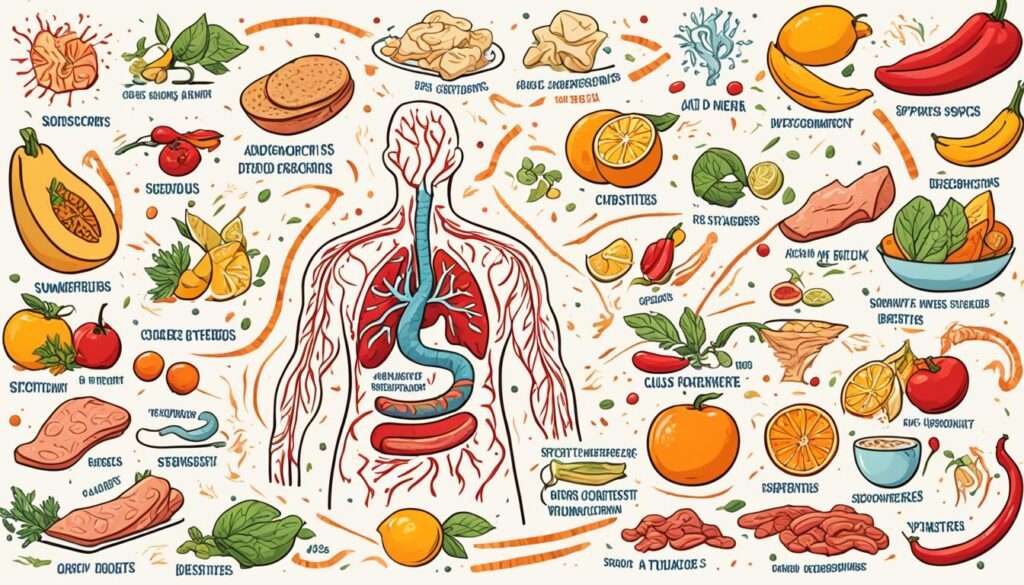
It’s key to understand the unique causes and symptoms of acid reflux and IBS. This helps you find the right ways to manage them. By knowing what triggers your symptoms, you can work with your doctor to improve your digestive health and ease the effects of these common issues.
The Role of Diet in Managing Acid Reflux and IBS
Diet is key in handling acid reflux and irritable bowel syndrome (IBS) symptoms. By avoiding trigger foods and adding gut-friendly foods, you can ease discomfort and boost digestive health.
Some foods can make acid reflux worse by relaxing the muscle that keeps stomach acid down. Also, certain foods can trigger IBS symptoms like bloating and pain. It’s important to know which foods to avoid.
Creating a diet plan for acid reflux and IBS is crucial. By knowing what foods trigger your symptoms, you can make better food choices. This helps manage your symptoms and enhance your life quality.
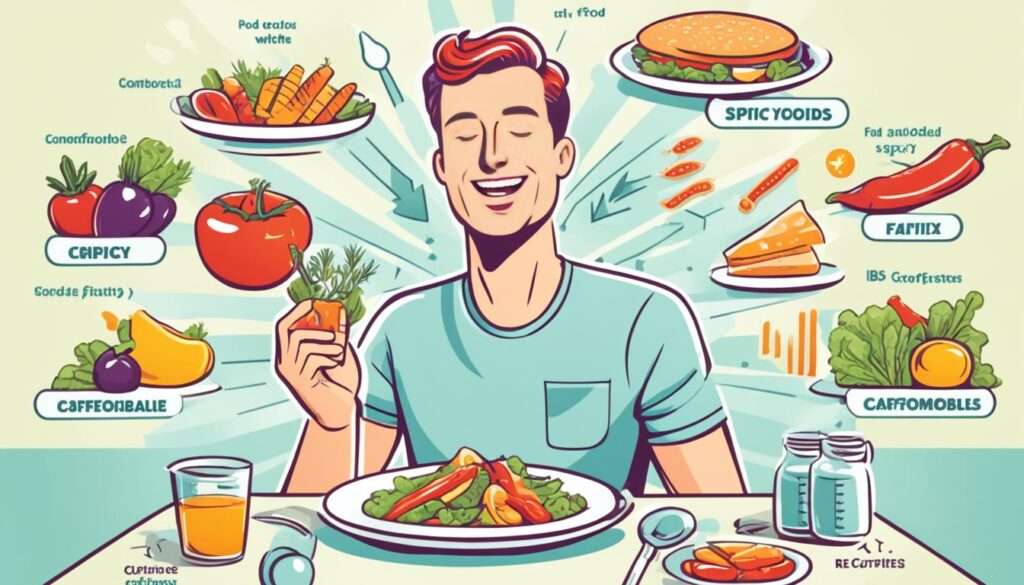
To succeed with diet, listen to how your body reacts to foods and adjust as needed. Keep a food diary to spot patterns and trigger foods. Then, work with a healthcare provider or dietitian for a tailored plan.
- Eat more fiber-rich foods like fruits, veggies, and whole grains to help with digestion and ease symptoms.
- Add foods high in probiotics, such as yogurt, kefir, and fermented veggies, to support gut health.
- Reduce spicy, acidic, fried, and greasy foods as they often trigger acid reflux and IBS.
By choosing foods wisely and using proven strategies, you can manage acid reflux and IBS through diet. This approach can greatly improve your digestive health.
Foods to Avoid with Acid Reflux and IBS
If you have acid reflux or irritable bowel syndrome (IBS), watch what you eat. Some foods can make your symptoms worse. Here are the main foods to avoid.
Spicy and Acidic Foods
Spicy and acidic foods are bad news for acid reflux and IBS. Foods like citrus fruits, tomatoes, hot sauces, and vinegar-based dressings can hurt your stomach lining. This leads to more acid and discomfort. Try to avoid these foods to keep your symptoms under control.
Fried and Greasy Foods
Fried and greasy foods are tough on your digestive system if you have acid reflux or IBS. They can cause gas, bloating, and discomfort. Choose healthier cooking methods like baking, grilling, or sautéing instead of deep-frying. This can help ease your symptoms.
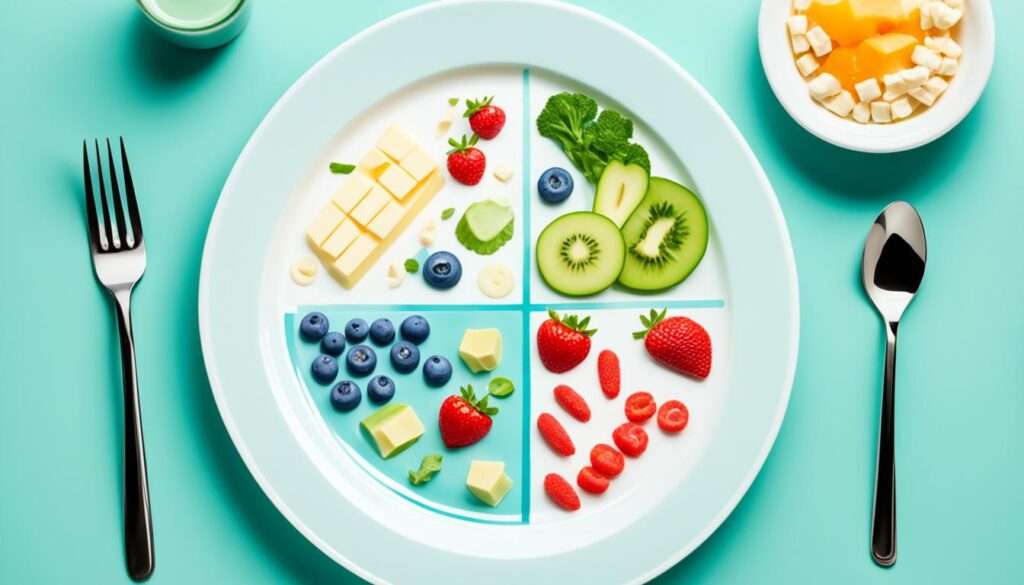
Dairy Products and Acid Reflux
If you’re dealing with acid reflux, check your dairy intake. Products like milk, cheese, and yogurt might be a problem. They have fats that can relax the muscle at the top of the stomach. This lets stomach acid flow back up, causing discomfort.
Some people with acid reflux also can’t digest lactose, making dairy worse. This intolerance can make acid reflux symptoms worse, causing more discomfort.
To help with acid reflux, think about cutting down on or avoiding dairy. This can lessen acid reflux episodes and ease symptoms. Making this change might help you feel better and have more control over your condition.

Caffeinated Beverages and IBS
If you have irritable bowel syndrome (IBS), watch your caffeine intake. Caffeine can make IBS worse by speeding up digestion and causing more bowel movements.
Coffee and Tea
Coffee and tea are popular caffeinated drinks. They give you energy but might make IBS symptoms worse. The caffeine can upset your stomach, causing diarrhea, pain, and bloating.
Carbonated Drinks
Drinks like soda can be tough on IBS sufferers. Their carbonation can cause gas, bloating, and discomfort. Plus, they often have artificial sweeteners that can make IBS worse.
To help with IBS, cut down on caffeinated and fizzy drinks. Choose water, herbal tea, or non-carbonated fruit juices instead. These can help you stay hydrated and support your digestive health.

Alcohol and Its Impact on Acid Reflux and IBS
If you have acid reflux or irritable bowel syndrome (IBS), think twice about your alcohol use. Alcohol can make these digestive issues worse, leading to more discomfort.
Alcohol relaxes the muscle that keeps stomach contents from going back up. This can cause more acid reflux, making your chest and throat burn. It also irritates your digestive tract, making IBS symptoms like stomach pain, diarrhea, and bloating worse.
People with acid reflux and IBS should limit or avoid alcohol to reduce symptoms. Being careful with alcohol can help manage your digestive health and improve your overall well-being.
If you’re not sure how alcohol affects you, talk to your healthcare provider. They can give you advice on managing your symptoms and finding the right diet and lifestyle balance.
Acid Reflux And IBS
Knowing how certain foods affect your digestive system is key to managing acid reflux and irritable bowel syndrome (IBS). Your diet plays a big role in these conditions. Some foods can make symptoms better or worse.
Irritating Foods and Acid Reflux
Spicy, acidic, fried, and greasy foods often trigger acid reflux. They can irritate your esophagus, causing that burning feeling. Avoiding these foods can help reduce acid reflux episodes.
Gut Microbiome Disruption and IBS
For people with IBS, some foods can disrupt the gut microbiome. This leads to more inflammation and worse symptoms. Foods like dairy, caffeinated drinks, and fried foods can be bad for IBS sufferers. Knowing how these foods affect your gut is key to managing IBS.
Understanding how your diet affects acid reflux and IBS lets you avoid foods that make symptoms worse. This knowledge helps you make better food choices and find relief.
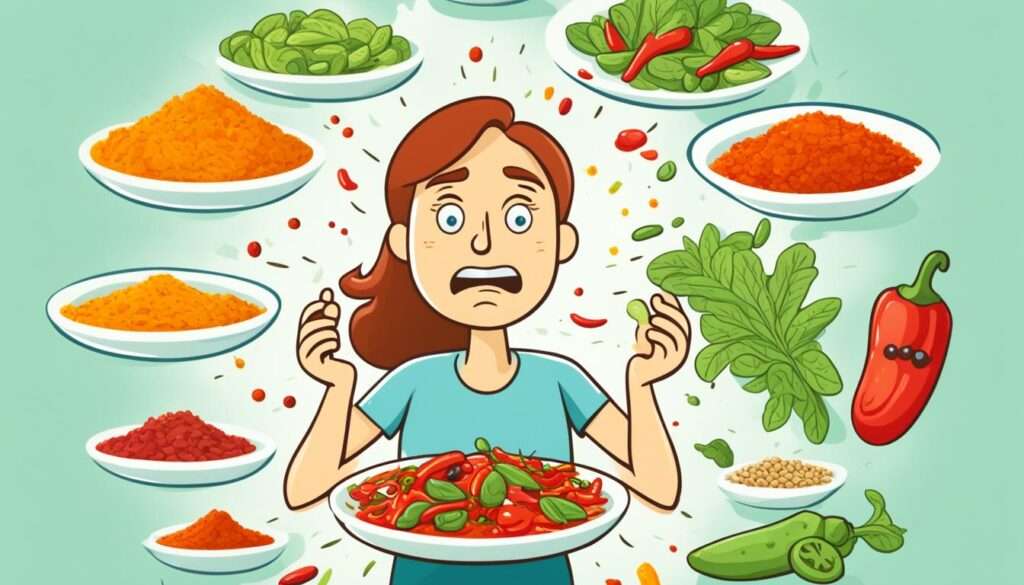
Alternative Food Options
When dealing with acid reflux and irritable bowel syndrome (IBS), some foods should be avoided. But, there are many foods that can help ease these symptoms. Foods high in fiber and probiotics can make digestion better and lower the chance of acid reflux and IBS.
Fiber-Rich Foods
Foods high in fiber, like whole grains, fruits, and veggies, are key for managing acid reflux and IBS. They help keep bowel movements regular and lower acid reflux risk by aiding digestion. Here are some fiber-rich foods good for your gut:
- Oats
- Barley
- Beans
- Lentils
- Broccoli
- Berries
- Avocados
Probiotic-Rich Foods
Probiotic-rich foods are also great for those with acid reflux and IBS. These foods have good bacteria that help balance gut flora. This improves digestion and lessens IBS symptoms. Here are some probiotic-rich foods for a gut-friendly diet:
- Yogurt
- Kefir
- Sauerkraut
- Kimchi
- Miso
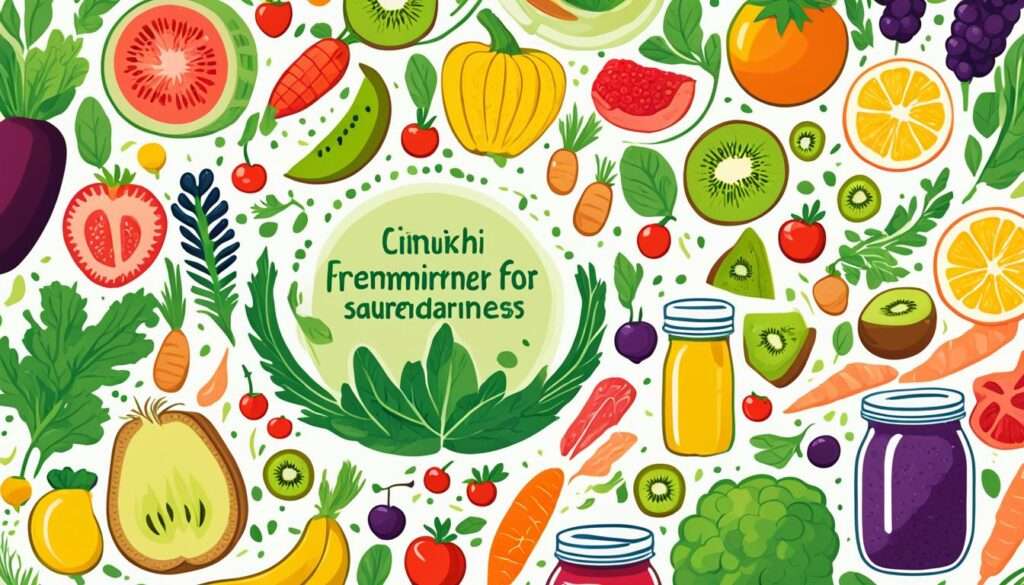
Adding these fiber-rich and probiotic-rich foods to your diet can support your digestive health. It may also ease acid reflux and IBS symptoms. Always talk to your healthcare provider for diet advice tailored to your needs.
Tips for Maintaining a Healthy Diet
When you have acid reflux and irritable bowel syndrome (IBS), eating right is key. It’s important to avoid trigger foods and focus on portion control and eating slowly. Big meals can put too much pressure on your stomach, making acid reflux and IBS worse.
Portion Control
Managing acid reflux and IBS means controlling your food portions. Eat smaller meals often instead of big ones. This helps your body digest food better and lowers the chance of digestive problems. Always stop eating when you’re full, even if there’s food left.
Eating Slowly
Eating slowly is good for your stomach. Mindful eating makes you feel full with less food. It also helps you chew your food well, making digestion easier.
By eating smaller and slower, you can ease acid reflux and IBS symptoms. This leads to better digestion and overall health.
Lifestyle Changes for Better Symptom Management
Dealing with acid reflux and irritable bowel syndrome (IBS) can be tough. But, making lifestyle changes can be as powerful as changing what you eat. Simple daily changes can help manage symptoms and boost your health.
Keeping a healthy weight is key. Being overweight can put pressure on your stomach, making reflux and IBS worse. Regular exercise like walking, swimming, or low-impact sports can help you stay at a healthy weight. It also lowers stress.
Stress is another big factor. It can mess with your gut balance and make symptoms worse. Using stress-reducing activities like meditation, deep breathing, or yoga can help. These can make daily life easier and ease your digestive issues.
Good sleep is also vital for your health. It affects acid reflux and IBS symptoms a lot. Try to get 7-9 hours of good sleep each night. Stick to a regular sleep schedule to keep your body in rhythm.
By combining these lifestyle changes with a diet free of triggers, you can manage acid reflux and IBS well. This approach can greatly improve your life quality.
When to Seek Medical Advice
Making changes to your diet and lifestyle can help with acid reflux and irritable bowel syndrome (IBS). But sometimes, you might need to see a doctor. If your symptoms don’t get better or get worse, it’s time to talk to a healthcare expert. A gastroenterologist can give you a proper diagnosis and suggest the right treatment.
Severe or sudden symptoms mean it’s time to get medical help. If you have bad acid reflux, ongoing stomach pain, or changes in your bowel habits, don’t ignore them. A doctor can figure out what’s causing your issues and create a plan just for you.
Home remedies and lifestyle changes can help, but they might not fix everything. By seeing a professional, you can learn more about your condition. You might find treatments like medicines, diet changes, or special therapies that work better for you.
If your symptoms keep up or get worse, don’t wait to get help. Your doctor can guide you to the best way to handle your acid reflux and IBS. This can make you feel much better overall.
Conclusion
Managing acid reflux and irritable bowel syndrome (IBS) means looking at your diet and lifestyle. By avoiding foods that trigger your symptoms, you can improve your digestive health. A balanced diet and lifestyle changes can help you control acid reflux and IBS symptoms.
Changing your diet and habits can greatly improve your health. By making these changes, you can take charge of your digestive health. Working with your healthcare providers is key to finding the right solutions for you.
Keeping your digestive system healthy is crucial for your overall well-being. By following the advice in this article, you can start on the path to a more comfortable life. Start making those changes today and begin your journey to better digestive health.
FAQ
What is acid reflux and how does it differ from irritable bowel syndrome (IBS)?
Acid reflux, also known as gastroesophageal reflux disease (GERD), is when stomach acid goes back up into the esophagus. This can cause heartburn, nausea, and trouble swallowing. Irritable bowel syndrome (IBS) is a long-term gut disorder. It brings on stomach pain, bloating, and changes in how often you go to the bathroom, like diarrhea or constipation.
How does diet play a role in managing acid reflux and IBS?
Diet is key in handling acid reflux and IBS. Some foods can make symptoms worse, while others can help. By avoiding foods that trigger symptoms and eating more gut-friendly foods, you can manage acid reflux and IBS better and boost your gut health.
What are some of the foods that should be avoided when dealing with acid reflux and IBS?
Avoid spicy and acidic foods, fried and greasy foods, dairy products, and caffeinated drinks when you have acid reflux and IBS. These foods can upset your stomach and make symptoms worse.
How do dairy products and caffeinated beverages impact acid reflux and IBS, respectively?
Dairy products can relax the muscle at the top of the stomach, letting acid flow back up. This can be a problem for people with acid reflux. Some might also be lactose intolerant, making dairy worse. Caffeinated drinks like coffee, tea, and soda can make your digestive system work harder. This can lead to more bowel movements and make IBS symptoms worse.
Why do certain foods worsen the symptoms of acid reflux and IBS?
Some foods can make acid reflux and IBS symptoms worse because of how they affect your digestive system. Spicy, acidic, fried, and greasy foods can irritate the esophagus and trigger acid reflux. Foods like dairy and caffeinated drinks can upset the balance of good and bad bacteria in your gut. This can cause more inflammation and make IBS symptoms worse.
What are some alternative food options that can help alleviate the symptoms of acid reflux and IBS?
Eating foods high in fiber, like whole grains, fruits, and veggies, can help with bowel movements and reduce acid reflux. Foods with probiotics, such as yogurt, kefir, and fermented veggies, can also help balance gut bacteria. This can improve digestion and lessen IBS symptoms.
When should you seek medical advice for your acid reflux and IBS symptoms?
If your symptoms don’t get better or get worse, or if they’re severe or unexpected, see a doctor. A gastroenterologist can give you a proper diagnosis and suggest the right treatment.
Source Links


